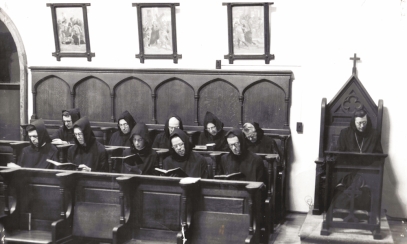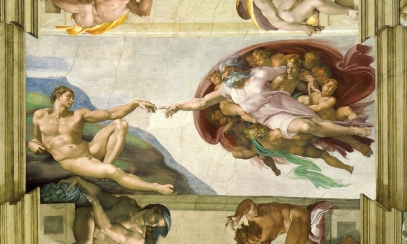
Questions from high school students about faith
“There is a HUGE disconnect with me about hell. We learn so much about how loving God is and how He will always love us, but why does He permanently condemn people to hell?”
“There is a HUGE disconnect with me about hell. We learn so much about how loving God is and how He will always love us, but why does He permanently condemn people to hell?”
Hell isn’t an easy topic; it’s complicated and nuanced, and it takes some level of theological examination to understand what the Church teaches about hell. But, that’s not usually the way hell is portrayed. Hell is often depicted in a very simple, cut and dry sort of way. Popular culture images of hell show red devils with pitchforks, fiery landscapes, and locked gates. From those descriptions, hell looks like an eternal prison where people are sent against their will. While those images visually explain that hell is a terrible place — which it certainly is — those images of hell don’t explain the whole picture. So, in the words of Maria from The Sound of Music, “Let's start at the very beginning.”
Hell isn’t an easy topic; it’s complicated and nuanced, and it takes some level of theological examination to understand what the Church teaches about hell. But, that’s not usually the way hell is portrayed. Hell is often depicted in a very simple, cut and dry sort of way. Popular culture images of hell show red devils with pitchforks, fiery landscapes, and locked gates. From those descriptions, hell looks like an eternal prison where people are sent against their will. While those images visually explain that hell is a terrible place — which it certainly is — those images of hell don’t explain the whole picture. So, in the words of Maria from The Sound of Music, “Let's start at the very beginning.”
“In the beginning, God created the heavens and the earth.” (Gn 1:1) That’s an important starting point for us. God created because of His overflowing goodness, His overflowing love. God made something “very good” when He made creation, as He Himself says later in Genesis. The whole point of God’s creation was so that all things could be in perfect harmony with Him. We see that most poignantly in mankind. God created man and woman to be united to Him. As the ever-famous Baltimore Catechism states, “God made me to know Him, to love Him, and to serve Him in this world, and to be happy with Him forever in Heaven.” In any discussion of hell, that starting point is absolutely essential: God made us to be happily united with Him. That’s love.
That all sounds nice. God made us for Heaven. He made us out of love. Everything is hunky-dory. We shouldn’t have to worry about hell. Right? Well, there’s one little point we haven’t discussed yet: freedom. In order for love to be real, it has to be free. Let’s consider an example. It’s a hot Alabama day in July. You see a homemade ice cream stand and wait in line for the best mint chocolate chip ice cream of your life. After you get your ice cream cone — which you’ve been waiting so long to enjoy — you see your friend across the street. You know that your friend loves mint chocolate chip ice cream, so you turn around to get a second ice cream cone, only to see that the homemade ice cream stand is now closed! Because you love your friend, you walk across the street and give him your ice cream cone. You sacrifice eating the ice cream cone yourself out of love for your friend. That’s sacrificial love. You choose the good of your friend over yourself.
But imagine a second scenario. You got the ice cream cone, and you decided NOT to give it to your friend. You decided to eat it yourself, and just as you were going to take the first bite of that ice cream cone, your friend came up to you with a baseball bat and said, “If you don’t give me your ice cream cone, I’m going to hit you really hard with a baseball bat.” And so, you gave your friend the ice cream cone.
In both scenarios, the result is the same: you give the ice cream cone to your friend. But in the first scenario, you do it out of love; you freely make a gift. You choose, with full freedom, to give the ice cream cone to your friend. However, in the second scenario, you give the cone out of fear. There’s no sacrificial love involved because you’re not making a free choice. You’re giving the ice cream cone because of the force of another, not because of your own love.
As you can see from this example, freedom is necessary for true love. Yes, God made us to be with Him in Heaven. After all, our hearts are designed to be with God, but we have to choose to be with God. Our love for God is free, not forced. If God forced us to love Him, if God forced us to be with Him in Heaven, then we wouldn’t be free to choose Him. And so, in God’s mercy and love for us, He allows us to make a decision to be with Him in Heaven or not. Of course, God always wants us to be with Him in Heaven. Nothing we ever do can change that desire of God to be with us, but God also doesn’t force us to be with Him in Heaven if we don’t want to be.
Instead of thinking about God condemning people to hell, perhaps it’s more accurate to think about people choosing to separate themselves from God. Hell is a state of separation from God — not because God has chosen to separate us from Himself, but because we have chosen to separate ourselves from God. That’s hell: us choosing to be apart from God. And as we said above, God allows us to choose to be apart from Him because we’re not slaves — God made us free. Here’s the amazing thing: even though someone might choose to separate themselves from God, even though someone might choose to live apart from God, God still loves them. Even though we might not love God, He loves us. As our Abbot Hilary used to say, “God loves you, and there’s not a damn thing you can do about it!”
Father Paschal Pautler, O.S.B., is a monk and priest of St. Bernard Abbey in Cullman. Hailing from Birmingham, Father Paschal was educated by the Nashville Dominican Sisters at St. Rose Academy and then by the Monks of St. Bernard Abbey at St. Bernard Preparatory School. After graduation from high school, he entered the monastery. He was ordained a priest in 2023, and he presently serves as the Development Director for St. Bernard Abbey and Preparatory School.



